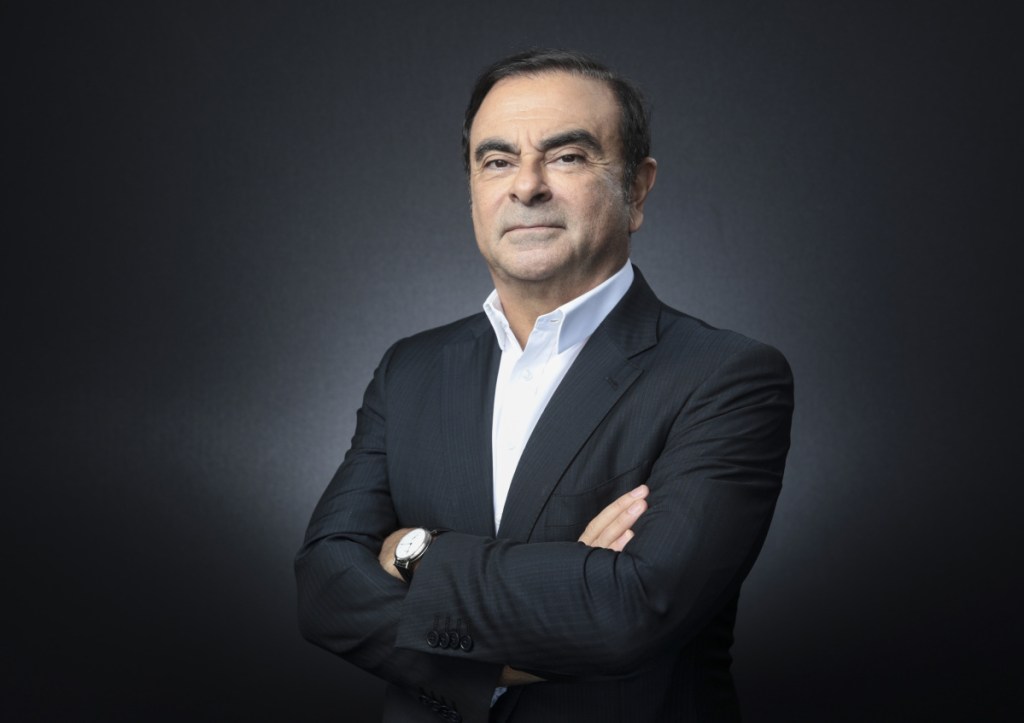YOKOHAMA, Japan — Nissan Motors said Monday that chairman Carlos Ghosn has been arrested and will be dismissed after the company uncovered “significant acts of misconduct,” including underreporting his own salary and using company assets for his personal benefit.
Ghosn is considered one of the car industry’s top executives and is one of the most highly paid corporate bosses in Japan. He is widely credited with having saved Nissan from near-bankruptcy. He also serves as chairman and chief executive of France’s Renault and chairman of Mitsubishi Motors.
Brazilian-born, of Lebanese descent and a French citizen, he is one of the few foreigners in such a senior position in Japan.
Nissan said it conducted an internal investigation for several months based on a report from a whistleblower regarding misconduct by Ghosn and Representative Director Greg Kelly. It shared its findings with public prosecutors for their own parallel investigation.
“I am not in a position to talk about the progress of the investigation itself, but as a result of the investigation, we heard that the arrests have been made of the two gentlemen,” CEO Hiroto Saikawa told a news conference in the company headquarters in Yokohama.
Saikawa said he would convene a meeting of the board Thursday to remove Ghosn and Kelly.
Nissan said its investigation showed numerous “significant acts of misconduct,” including underreporting Ghosn’s compensation to the Tokyo Stock Exchange to the tune of more than $40 million over five years. It also said he used investment funds for personal gain and misused company expenses.
Nissan said Kelly was also deeply involved in the wrongdoing. Saikawa described both men as the masterminds of the alleged misconduct.
Renault shares tumbled nearly 10 percent in Paris, while Nissan’s German-listed securities fell by a similar amount.
Ghosn, 64, began his career at tiremaker Michelin in France in 1976 before moving on to Renault in 1996. There he helped engineer a turnaround in the carmaker’s fortunes that earned him the admiration of the business world but not of labor unions or leftist politicians, who resented his high salary while he presided over massive job losses in the wake of the global financial crisis.
He joined Nissan in 1999 after Renault bought a controlling stake and became its CEO from 2001 until 2017, engineering a similar turnaround there and earning the nickname “Le Cost Cutter.”
Ghosn stepped down as Nissan CEO last year but remained chairman of the company.
He became a star in the business world in Japan, appearing on magazine covers dressed in a kimono and even spawning a manga comic book on his life, although he also attracted more criticism there for his high salary. Ghosn was one of the first executives to champion electric cars, and he also developed a range of low-cost cars for emerging markets.
In June, Renault shareholders approved Ghosn’s $8.5 million compensation for 2017. He also received the equivalent of more than $10 million in his final year as Nissan chief executive.
In a late-night news conference lasting about 90 minutes, Saikawa, the Nissan CEO, did little to hide his anger at Ghosn for letting the company down.
“The concentration of power in one individual,” as well as Ghosn’s “long reign” at the automaking conglomerate, impacted operations and could have been factors in allowing the misconduct to take place, he said.
“People who reported to Mr. Ghosn became limited in number,” Saikawa said. As a result, instead of taking decisions based on a range of information and opinions, Ghosn “made decisions based on limited input in some cases.”
Saikawa also spent considerable time expressing his deep regret over the “bewilderment and anxiety” that the news has caused employees and stakeholders.
“It’s very difficult to express this in words,” he said. “Beyond being sorry, I feel big disappointment and frustration and despair and indignation and resentment.”
The news is the latest scandal to sully Nissan’s brand. In July, it acknowledged that it had uncovered falsified emissions data from most of its factories in Japan, and in 2017 it admitted it had allowed unqualified personnel to carry out post-production tests at some of its plants, forcing it to recall more than a million vehicles for reinspection.
Tim Hubbard, assistant professor of management in the University of Notre Dame’s Mendoza College of Business, said Ghosn’s arrest complicates a highly interconnected set of relationships between Nissan, Renault and Mitsubishi Motors – and could affect the equity stakes they have in each other.
“This has widespread implications for a large portion of the auto industry, as these alliances have become more critical in the increasingly interconnected design, manufacturing and support of auto customers worldwide,” he said. “Ghosn’s arrest is another unfortunate example of the perils of having too much power concentrated in one individual within – and across – corporations.”
One of the puzzles was why Ghosn, with all his wealth, might have wanted to defraud his own company, if the accusations are true.
“It seems very short-sighted to me, when you have that much money, why you would want to nickel-and-dime the company and shareholders,” said Carl Tobias, a professor at the University of Richmond’s law school.
Send questions/comments to the editors.



Success. Please wait for the page to reload. If the page does not reload within 5 seconds, please refresh the page.
Enter your email and password to access comments.
Hi, to comment on stories you must . This profile is in addition to your subscription and website login.
Already have a commenting profile? .
Invalid username/password.
Please check your email to confirm and complete your registration.
Only subscribers are eligible to post comments. Please subscribe or login first for digital access. Here’s why.
Use the form below to reset your password. When you've submitted your account email, we will send an email with a reset code.